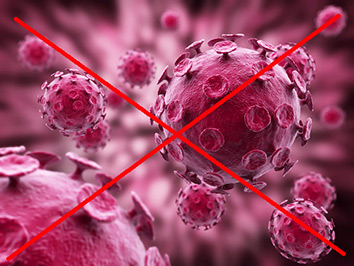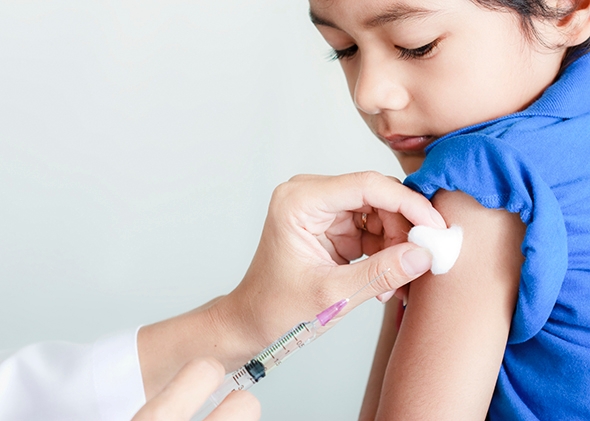Ten Things to Know About Vaccines

October is Breast Cancer Awareness Month. This is a pretty good idea; I support raising awareness of a serious health issue.
… which is why I like to raise awareness of another serious health issue: anti-vaxxers. As it happens, for the past few years they have tried to hijack the idea of Breast Cancer Awareness Month for their own purposes. They’ve deemed it Vaccine Injury Awareness Month, and have been tweeting about it with hashtags such as #VaxTruth, #HearThisWell, and #CDCWhistleblower (that last in reference to an entirely overblown and factually challenged conspiracy theory about vaccines and autism research at the Centers for Disease Control and Prevention).
Update, Oct. 4, 2014 at 18:15 UTC: The paper that spawned the anti-vax conspiracy theory—about incidence of autism in African American boys after vaccination—has been retracted over concerns about conflicts of interest and use of incorrect statistical methods. This is pretty much exactly in line with what we had predicted and is a major blow to the anti-vaxxers ... not that I think they will stop using the paper as evidence anyway; they will just enlarge the conspiracy. Bet on it.
I learned about this reading Orac’s site. His frustration and anger over this issue is entirely understandable; we're dealing with a very important issue—threats to public health by terrible diseases—where people’s lives are directly at risk. And yet we have a group of people who are for the most part honestly concerned about the same issue, but don’t seem to understand the science behind it. On top of that, given that children are involved, many people are understandably upset and very defensive about the topic. This makes discussing it extremely difficult; from my own experience when I try to point out just why anti-vax rhetoric is wrong, no matter how delicately I put it, I get accused of all sorts of horrible things. The irony of the situation is palpable.
But the fallacious and dangerous reasoning of anti-vaxxers must be pointed out, and we must continue to point it out, because, like when fighting the diseases we keep seeing recur, you must periodically get a booster shot of reality to maintain immunity.
So I took to Twitter. Being no stranger to the irony, I decided to hijack the hashtags the anti-vaxxers have been using to hijack October, and put up a series of tweets telling the truth about vaccines. Here they are, in order, with a brief comment to give more info.
1) There is no evidence for a connection between autism and vaccines. http://t.co/PcrV5cBanG #VaxTruth #HearThisWell
— Phil Plait (@BadAstronomer) October 3, 2014
This is the key idea behind the anti-vaccination movement—vaccines are somehow causing autism incidence to rise—and it’s entirely without merit. Everything else comes from that: the idea that vaccines have toxins, the scheduling is too many too soon, and so on. None of those ideas pans out, but that doesn’t stop a lot of anti-vaxxers from rehashing them.
2) MYTH: “Vaccines didn’t save us” from measles. Actually, yes, they did. http://t.co/V0JocbbKQ0 #VaxTruth #HearThisWell
— Phil Plait (@BadAstronomer) October 3, 2014
This is one I’ve seen a lot, and I’m glad Dr. David Gorski put up a simple debunking of it. The reason we don’t have hundreds of thousands of measles cases every year in the U.S. is due to vaccines.
3) Vaccines are a huge medical success story. http://t.co/gsR4ncjLs1 & http://t.co/EPHOsWNN4I #VaxTruth #HearThisWell
— Phil Plait (@BadAstronomer) October 3, 2014
Some anti-vaxxers try to downplay the role of vaccines, but the reason we don’t see smallpox anywhere at all, ever, is due to a global smallpox vaccine campaign. And we’re seeing increasing uptake of vaccinations reducing illnesses worldwide, too.
4) The modern anti-vax movement got started based on totally discredited work. http://t.co/1xvgRcdMdK #VaxTruth #HearThisWell
— Phil Plait (@BadAstronomer) October 3, 2014
Follow the links; Andrew Wakefield’s work has been thoroughly discredited, he’s been accused of fraud, and even his co-authors on the original paper have abandoned him. And did you know that he stood to make hundreds of millions of dollars by inciting fear of the MMR vaccine? This is something science-based vaccine researchers are accused of by anti-vaxxers quite often.
5) Anti-vax advocation has been linked to outbreaks of dangerous diseases. http://t.co/WhMTgFLZ6B #VaxTruth #HearThisWell
— Phil Plait (@BadAstronomer) October 3, 2014
This is not terribly surprising. In places where we've seen outbreaks of vaccine-preventable diseases, vaccine uptake rates are low. And in many of those places, there are direct links to pockets of people resisting getting vaccinations. Sometimes you can pretty easily pin causation to correlation.
6) The people most vulnerable to vaccine-preventable diseases? Babies. http://t.co/qQQa1pYrv7 #VaxTruth #HearThisWell
— Phil Plait (@BadAstronomer) October 3, 2014
In general, the three most vulnerable groups to vaccine-preventable illnesses are infants too young to be vaccinated yet, the elderly, and people who are immune-compromised (those who are allergic to the vaccines, people undergoing chemotherapy, and so on). When you don’t vaccinate, you can be a carrier for diseases against which other people cannot protect themselves.
Sure, it’s your body, and your choice. But make sure you’re making that choice with all the information. You can spread diseases long before you know you even have them, and someone else may pay the terrible price for your choice.
And in a more general sense, we need as many people vaccinated as possible, to maintain herd immunity and protect those who cannot protect themselves.
7) Opinions are not facts. http://t.co/5OqzpTXfli #VaxTruth #HearThisWell
— Phil Plait (@BadAstronomer) October 3, 2014
Self-explanatory. Yet we need to explain it again and again.
8) Here’s a quick-and-easy list of debunked anti-vax myths, by @DrRachie. http://t.co/tL9KqgAh6s #VaxTruth #HearThisWell
— Phil Plait (@BadAstronomer) October 3, 2014
This article, written by my friend Rachael Dunlop, is an excellent resource to debunk long-overused tropes of the anti-vax movement. Keep that link handy.
9) Flu season is starting up. Got vax? I walk the walk every year. http://t.co/qngui4LyFq #VaxTruth #HearThisWell
— Phil Plait (@BadAstronomer) October 3, 2014
I get accused of talking the talk sometimes, and I think it helps to show I put my money where my mouth is. I’m fully vaccinated, as are my wife and daughter. We do this for ourselves, and to protect those around us, too.
10) Want more? Follow @tweek75 @sethmnookin @lizditz @ImmunizeCOKids @bengoldacre And read http://t.co/1TR9JlLBBW #VaxTruth #HearThisWell
— Phil Plait (@BadAstronomer) October 3, 2014
I could make that list a lot longer, but that link and those people on Twitter are an excellent start for finding the truth about vaccines. To wit: Vaccines are effective, their risk is incredibly low, and they are one of the greatest health benefits humans have ever devised.
Go talk to your board-certified doctor, and find out if you need to get any vaccinations or boosters. Thanks.


